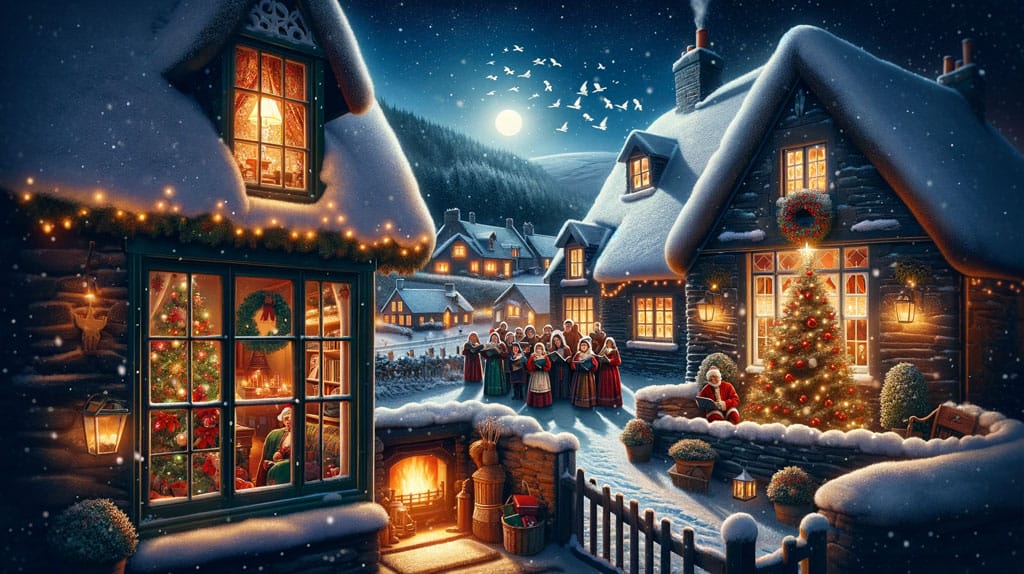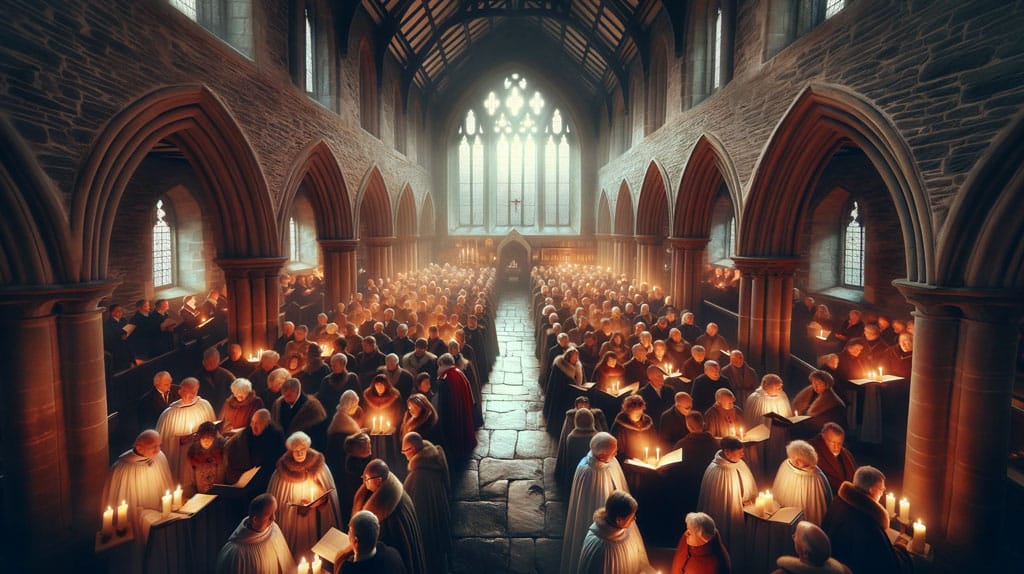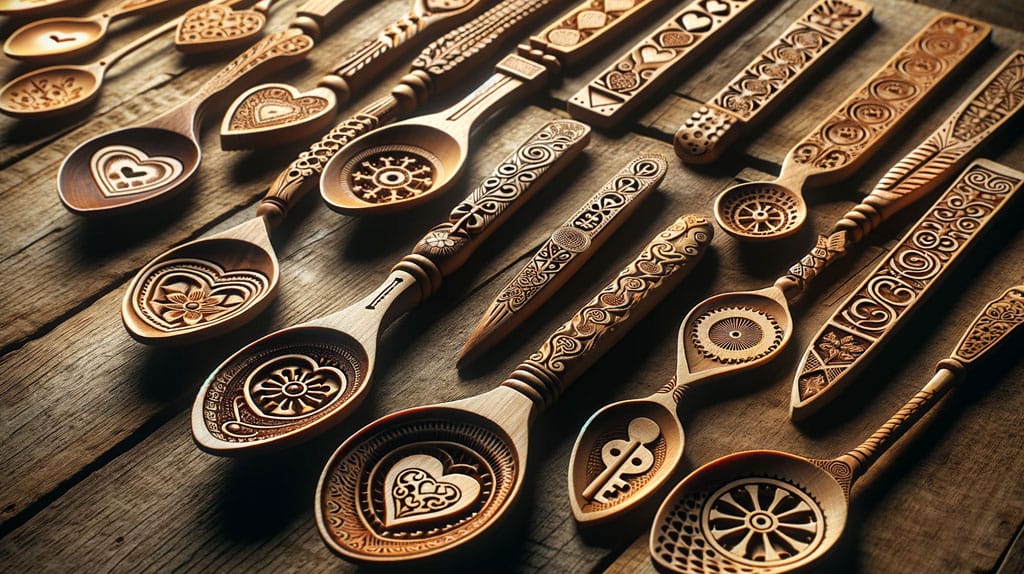Your Guide to Welsh Christmas Traditions

Immerse yourself in the Yuletide spirit Welsh-style, where ancient customs and heartfelt carols by candlelight distinguish a Welsh Christmas from the rest of the UK. From the harmonious plygain to the craftsmanship of love spoons, discover how Wales honors its past while celebrating the festive season with a unique blend of tradition and communal warmth.
While many of these traditions have been around for centuries, they continue to inspire and delight people of all ages today. Whether you’re a Welsh native or simply curious about European Christmas traditions, this comprehensive guide will take you on a journey through the captivating world of Welsh Christmas celebrations.
Key Takeaways:
- Welsh Christmas traditions are unique and enchanting, passed down through generations
- From Plygain Dawn Service to Mari Lwyd, there’s no shortage of festive customs in Wales
- Families often decorate their homes with fresh holly and mistletoe and exchange love spoons as Christmas gifts
- Traditional Welsh foods, such as Bara Brith and Cawl Cennin, are also an integral part of the holiday season
- Welsh choirs, renowned for their exceptional talent, perform throughout the Christmas season, adding to the festive atmosphere
What Makes Christmas Special in Wales
Christmas in Wales holds a special charm that is woven into the fabric of its cultural and historical tapestry.
It’s a time when the rich Welsh heritage comes alive with its own set of unique traditions, such as the “plygain”, a traditional carol service held in churches between 3 and 6 am on Christmas morning. This service is characterized by the singing of intricate carols, or “carolau plygain,” which are often performed a cappella with harmonious voices echoing through the ancient church walls.
Homes and public spaces are adorned with festive decorations that often include fresh holly and mistletoe, which hold historical significance and add to the visual appeal. The air is fragrant with the scent of traditional Welsh cooking, where dishes like “cawl”, a hearty lamb stew, and “tawe”, a type of Welsh cake, bring families together around the dining table.
In addition to the culinary delights, Welsh Christmas is also about community and togetherness. Towns and villages across Wales host Christmas markets and fairs where local craftspeople sell their wares, from hand-carved love spoons to woolen goods, reflecting the nation’s artisanal heritage.
The sound of choirs singing traditional Welsh Christmas songs, known as “carolau Nadolig”, is a common and heartwarming element of the festivities, with performances often held in town squares, bringing people together in celebration.
Wales’s landscape, often dusted with snow during this time, provides a picturesque backdrop for such gatherings. The red dragon of Wales takes its place among the decorations, a reminder of national pride during the worldwide celebration of Christmas, making the holiday not just a festive season, but a reaffirmation of Welsh identity and culture.
Yuletide Echoes: The History of Welsh Christmas Festivities
The historical roots of Christmas in Wales are deep and culturally rich, intertwining pagan traditions and Christian beliefs. The ancient midwinter festival of Yule laid the groundwork with its celebration of the winter solstice, which later merged with the Christian celebration of Jesus’s birth.
Unique Welsh traditions have shaped the festivities, such as the plygain, a holdover from the medieval matins service, where people gather in the early hours before dawn to sing carols in a candlelit church.
The tradition of giving hand-carved ‘love spoons’ dates back to the 17th century and has evolved into a cherished gift-giving practice during the Christmas period. Additionally, the Mari Lwyd, a folk custom involving the parade of a decorative horse’s skull, highlights the blend of the macabre and merriment in Welsh winter customs.
These longstanding practices have evolved into today’s celebrations that retain the warmth of community spirit, the reverence of ancient customs, and the joyous expression of Welsh identity during the Christmas season.
Plygain Dawn Service and Festive Eisteddfod Competitions

Welsh Christmas traditions are unique and enchanting, and one of the most significant is the Plygain Dawn Service. This religious gathering takes place in the early hours of Christmas morning and involves an a capella performance by the choir. The service is an ancient Welsh custom dating back centuries, and locals gather in churches to experience the magical singing that echoes through the building.
The Plygain celebration has long been an important part of Welsh Christmas customs and is noted for its distinctive style of unaccompanied singing. The custom is believed to date back to the 13th or 14th century and is still kept alive in Welsh chapels and some churches
The Plygain Dawn Service is followed by festive Eisteddfod competitions, where poets and musicians showcase their talents in a joyful and competitive atmosphere. The Eisteddfod is a traditional Welsh festival of literature, music, and performance, and it has been celebrated for centuries. The competitions are separated by age group and category, and participants are judged on technique, originality, and creativity.
| Category | Award |
|---|---|
| Poetry | Bardic Chair |
| Music | Silver Harp |
| Dance | Medal |
These Eisteddfod competitions are an integral part of Welsh Christmas traditions, and locals participate with great enthusiasm. The event brings communities together, and the winners are celebrated and revered for their talents.
The Plygain Dawn Service and the Eisteddfod competitions are not just about the music and poetry; they represent a sense of community and belonging that is unique to Wales. It is an opportunity for the people to unite and express their love for their culture and heritage.
Welsh Choir Holiday Performances
Welsh choirs are a significant part of the Welsh Christmas traditions, and their holiday performances are nothing short of enchanting. The country is renowned for its choral tradition, and the voices of Welsh choirs are considered one of the purest forms of vocal harmony.
During the Christmas season, Welsh choirs perform a variety of music, from carols to contemporary interpretations of classic Christmas songs. These performances take place in various locations, including local churches, community centers, and concert halls.
The most popular Welsh Christmas carol is “Deck the Halls,” known in Welsh as “Nos Galan.” This classic carol’s melody is believed to have originated from an old Welsh tune and is often performed in four-part harmony by Welsh choirs.

The History of Welsh Choirs
Welsh choirs have a rich history that can be traced back to the 19th century when they gained prominence in Welsh culture. They were established to serve as a source of entertainment and community gathering, as well as to promote the Welsh language and culture.
Welsh choirs first gained international recognition in the 1870s when the Welsh National Eisteddfod was established, celebrating Welsh culture through music, literature, and art. The Eisteddfod provided a platform for Welsh choirs to showcase their talents and compete against one another.
The Welsh Male Voice Choir
The Welsh Male Voice Choir has become an iconic element of Welsh culture and has gained international recognition for its powerful and unique sound. The choir’s formation dates back to the 18th century, and the tradition continues to thrive today.
The Welsh Male Voice Choir has gained a reputation for its rich sound, deep harmonies, and powerful crescendos. The choir’s performances evoke a sense of pride and patriotism among the Welsh people, and their performances often include traditional Welsh songs and hymns.
The Welsh Choir Association – The Welsh Choir Association was established in 2008 to promote and celebrate the rich Welsh choral tradition. The association aims to bring together Welsh choirs from different regions of the country and provide them with opportunities to perform and compete against one another.
The Welsh Choir Association also aims to preserve the Welsh choral tradition for future generations by supporting young people interested in pursuing a career in music and organizing workshops and training sessions for aspiring young singers.
Yule Log Burning Ritual
One of the most cherished Welsh Christmas traditions is the Yule Log Burning Ritual. On Christmas Eve, the large log, representing the sun, is burned in the hearth to symbolize the end of darkness and the beginning of light.
The Yule Log Burning Ritual is often accompanied by Welsh carol singing. Communities gather to sing beautiful carols and spread the festive spirit. Welsh carols are unique, with haunting melodies and lyrics that speak to the heart of the holidays. These carols have been sung in Wales for centuries and continue to hold a special place in the hearts of the Welsh people.
“Deck the hall with boughs of holly,
Fa-la-la-la-la, la-la-la-la.
‘Tis the season to be jolly,
Fa-la-la-la-la, la-la-la-la.”
Mari Lwyd and Twelfth Night Wassailing
Welsh Christmas traditions are enchanting, and the Mari Lwyd and Twelfth Night Wassailing are among the most intriguing. The Mari Lwyd is a custom that involves carrying a horse skull adorned with ribbons and bells while singing and performing in front of people’s homes. This ancient custom is believed to originate from Welsh pagan rituals and is still celebrated in many parts of Wales.
Twelfth Night Wassailing is another cherished tradition in Wales and involves groups of people blessing orchards and singing to ensure a prosperous harvest. This custom takes place on the eve of Epiphany, which is January 5th, and signifies the end of the Christmas season.
Love Spoons as Christmas Gifts
When it comes to Welsh Christmas traditions, Love Spoons are a unique and meaningful gift that is often exchanged during the holiday season. These intricately carved wooden spoons have been part of Welsh culture for centuries and hold a special place in the hearts of the Welsh people.
The origins of Love Spoons can be traced back to the 17th century when Welsh sailors would carve wooden spoons while at sea. These spoons were often given to their sweethearts as a token of their affection when they returned home.

Over time, the tradition of carving Love Spoons evolved, and they became a popular gift for various occasions, including weddings, birthdays, and Christmas. Each spoon is a work of art, and the intricate carvings often have symbolic meaning.
The carving of Love Spoons is a craft that has been passed down through generations. Each spoon is hand-carved and holds a special meaning. For example, a spoon with a chain carved into it symbolizes the unbreakable bond between two people, while a spoon with two hearts intertwined represents the love shared between two individuals.
Love Spoons come in a variety of sizes and designs, and they are often customized to suit the recipient’s taste. Some spoons feature intricate designs and patterns, while others are more simple and elegant. Whatever the design, a Love Spoon is a unique and thoughtful gift that is sure to be treasured for years to come.
Christmas Taffy Making and Bara Brith Festive Bread
Welsh Christmas traditions are full of delightful treats, and two of the most beloved are Christmas taffy making and Bara Brith festive bread.
Christmas taffy making is a cherished custom that involves families coming together to create sweet and chewy taffy candies. This delicious treat is made by boiling sugar, butter, and vinegar, then flavoring it with vanilla, licorice, or other flavors before being pulled into long, thin strips. It’s a fun and tasty way to spend time with loved ones and create sweet memories.
Another festive treat that is enjoyed during the holiday season in Wales is Bara Brith, a traditional fruit bread. Made with dried fruit, tea, brown sugar, and flour, it is a flavorful and moist loaf that is perfect for sharing with family and friends during the Christmas season. It’s often served with butter or a dollop of clotted cream for an extra touch of indulgence.
Cawl Cennin Leek Soup
In addition to sweet treats like taffy and Bara Brith, Welsh Christmas dinners often feature savory dishes as well. One beloved dish is Cawl Cennin, a delicious leek soup.
Cawl Cennin is a hearty soup made with leeks, potatoes, carrots, and other vegetables. It’s often served with crusty bread and a side of cheese, making it the perfect comfort food for a chilly Christmas evening.
With its wide variety of sweet and savory dishes, Welsh Christmas cuisine is sure to delight your taste buds and make your holiday season all the merrier.
FAQ
What are Welsh Christmas traditions?
Welsh Christmas traditions are unique customs and practices that are passed down through generations in Wales during the holiday season.
What is the Plygain Dawn Service?
The Plygain Dawn Service is a religious gathering that takes place in the early hours of Christmas morning, where Welsh communities come together to celebrate and worship.
What are Festive Eisteddfod competitions?
Festive Eisteddfod competitions are joyful and competitive events where poets and musicians showcase their talents during the Christmas season in Wales.
How do Welsh choirs celebrate the holiday season?
Welsh choirs celebrate the holiday season by performing in various venues, ranging from local church concerts to grand performances in concert halls, spreading warmth and joy through their melodious voices.
What is the Yule Log Burning Ritual?
The Yule Log Burning Ritual is a traditional Welsh custom where a large log, symbolizing the sun, is burned on Christmas Eve to bring warmth and light into the home.
What is Welsh carol singing?
Welsh carol singing is a cherished tradition where communities gather to sing beautiful carols during the Christmas season, spreading the festive spirit and joy.
What is the Mari Lwyd tradition?
The Mari Lwyd tradition involves carrying a horse skull adorned with ribbons and bells while singing and performing in front of people’s homes, bringing a unique and enchanting atmosphere to Welsh Christmas celebrations.
What is Twelfth Night Wassailing?
Twelfth Night Wassailing is a tradition where groups of people go from house to house, blessing orchards and singing, to ensure a prosperous harvest and bring joy and good fortune to the community.
What is the Boxing Day Hunt?
The Boxing Day Hunt is a popular tradition in Wales that marks the start of the hunting season on December 26th, where riders on horseback gather for a day of hunting either foxes or trails.
What is a Noson Gyflaith toffee evening?
A Noson Gyflaith toffee evening is a delightful Welsh tradition where families and friends gather to make traditional toffee over an open fire, creating a warm and cozy atmosphere.
What is the Hunting the Wren Tradition?
The Hunting the Wren Tradition involves small groups of people going out to search for a fake wren, symbolizing the old year, and ceremonially “hunting” it, signifying the start of a new year and new beginnings.
What is the traditional Welsh greeting for Christmas?
The traditional Welsh greeting for Christmas is “Nadolig Llawen,” which means “Merry Christmas” in Welsh, and is used during the holiday season to spread joy and good wishes.
What is the significance of lighting the miner’s lamp?
Lighting the miner’s lamp during the holiday season is a symbolic gesture that pays tribute to Wales’ rich mining heritage, honoring the contributions of miners and their families.
Why is fresh holly and mistletoe used for decoration in Welsh homes?
Fresh holly and mistletoe are traditional decorations used in Welsh homes during the Christmas season as they symbolize protection, luck, and love, adding a festive touch to the surroundings.
What are love spoons and why are they exchanged as Christmas gifts in Wales?
Love spoons are intricately carved wooden spoons that hold a special place in Welsh culture. They are often exchanged as Christmas gifts to symbolize love, affection, and




